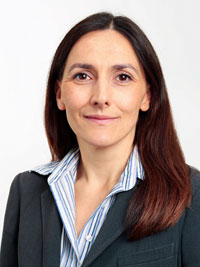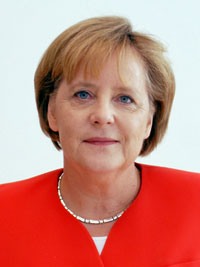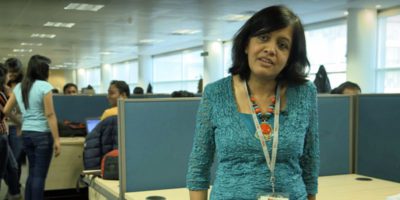Jennifer McKeown is the Chief European Economist at the independent economics consultancy, Capital Economics, where she has overall responsibility for the firm’s European, Nordic and Swiss economics services. She has been working in European economics for 15 years and before joining Capital Economics she worked at the Bank of England. Jennifer’s specialisms are in the German economy and monetary policy, and she has degrees in economics from University College London and the University of East Anglia.

“…we can think about interviews and assessment processes to make sure that women are able to showcase their own specific skills as well as those which are typically deemed to be more male…”
Jennifer, please can you tell us about your career to date and what made you want to get into economics?
I have always enjoyed economics. I like the factual nature of the topic, combined with the opportunities to write in a clear, coherent way. Its relevance to everyday life was really appealing to me too and I was lucky to have excellent GCSE and A-level teachers who passed on their enthusiasm for the subject.

After taking a degree in economics in Norwich, I applied for the graduate training scheme at the Bank of England and was accepted. I was very fortunate to be allocated to the Monetary Analysis area, which is central to interest rate policy, and to be offered the opportunity to take a funded Master’s degree. I learnt a great deal at the Bank of England and found it an excellent place to work, but in 2006 I decided that I wanted to work for a smaller, more commercial organisation.
I had already read and admired Capital Economics’ work as a part of my previous job and it became clear at my interviews that the company was an excellent fit for my skills and interests. I started out as a European Economist and my responsibilities gradually increased until I was recently promoted to Chief of our European team.
What does your role at Capital Economics involve on a day to day basis?

Around once or twice a week, I will do some type of presentation for clients, either outlining and discussing our views in general or focusing on a specific topic that interests them.
It seems like an interesting time to be analysing eurozone economies! Why is the role of the economist more important than ever?
It does feel like a particularly interesting time to be working on the eurozone, although I think I have said that at every stage of my career – there is always so much going on! I think we are in a very difficult period where policymakers need to address some serious political challenges and try to combine their hopes for ever closer union with a more practical approach that appeals to voters.
The risks of some kind of eurozone break-up seem greater than ever and this is something that we at Capital Economics have considered in detail, so we are in a great position to help our clients to think through the risks and their implications.
You have specialist knowledge of the German economy. How has having a female leader impacted on economic policy, if at all?

Having a strong and popular leader has been extremely important at a time when Germany has needed to address some very difficult issues both within the eurozone and globally. Ms. Merkel has managed to take a realistic and flexible approach, winning the sustained support of her own electorate and the respect of policymakers around the world.
I don’t think that the fact that she is a woman has impacted on policy and neither do I believe that the skills which have made her succeed are specific to females. However, she is clearly setting an excellent example of leadership and achievement to women everywhere and I hope that she encourages more young women into politics.
There’s a move towards anti-intellectualism in global politics and more challenging of expert opinion about the economy. How should economists respond to ensure their voices are heard?
We need to take a practical approach. At Capital Economics, we have very little time for models as we believe that they over-generalise, make too many assumptions and do not take economic history into account properly. Quantitative analysis has its place, but there is no substitute for human judgement and analysis. This approach forces us to understand and explain our views properly and also allows us to analyse risks as well as central scenarios.
In such an uncertain world, we can never be sure to get it right no matter how much effort we put into our forecasts. But if we can explain several alternative scenarios as well (and their implications), then we will have put our clients in a much better position to make investment decisions.
Economics has a reputation for being a male dominated area. Is this your experience and if so, is this changing at all?
I have certainly worked with a lot more men than women, but that has never bothered me. I haven’t come across any prejudice and feel fully respected within the company and by clients. There is no reason why the field of economics should be dominated by men and I think that this probably is changing and will continue to change over time.

What is your advice for other women and girls who want to learn more about careers in economics?
You must read newspapers. Only with a proper grasp of current affairs will you understand what a career in economics involves and become a successful economist. Of course, economic history is important too and reading around the topic will help you.
If you come across an economist that you particularly admire, male or female, try contacting them. You might be surprised at how ready they are to offer you advice.
Do not wait for the right job to be advertised. Seek out exactly what you want to do and try contacting the company directly. Many firms have roles available for the right person even if they are not currently advertising and you might get extra credit for taking the initiative.
What is coming up next for you and Capital Economics?
I have a lot of work to do! We are about to produce our quarterly forecast documents, which will involve many difficult judgements this time around. My team and I will be doing our best to keep on top of issues surrounding European economics and we won’t shy away from analysing contentious issues such as the risk of a departure of a large economy from the eurozone.
As for Capital Economics more widely, we will keep providing the analysis and making the bold calls that our clients need from us. We have been through a period of rapid expansion over recent years and we already cover all major economies from our five offices around the world. But a big project for us going forward will be to improve and increase the ways in which clients can access our analysis and forecasts, including through some major changes to our website.
https://www.capitaleconomics.com/
https://www.linkedin.com/company/capital-economics
Bank of England image credit: By Diliff (Own work) [CC BY-SA 3.0 (http://creativecommons.org/licenses/by-sa/3.0) or GFDL (http://www.gnu.org/copyleft/fdl.html)], via Wikimedia Commons
Angela Merkel image credit: By AM_Juli_2010_-_3zu4.jpg: Armin Linnartz derivative work: Off2riorob (AM_Juli_2010_-_3zu4.jpg) [CC BY-SA 3.0 de (http://creativecommons.org/licenses/by-sa/3.0/de/deed.en)], via Wikimedia Commons





